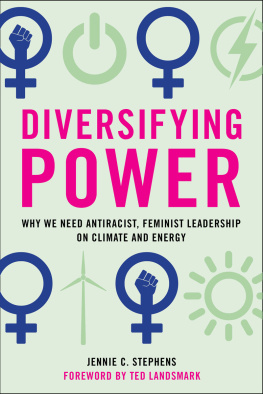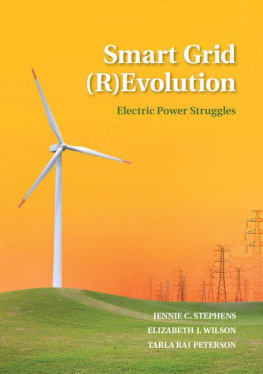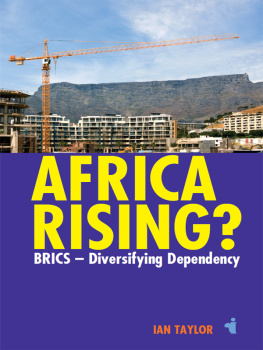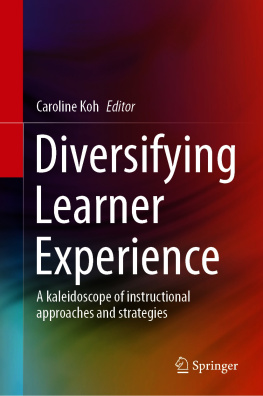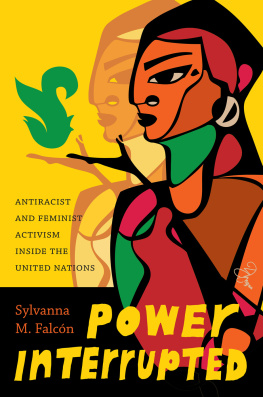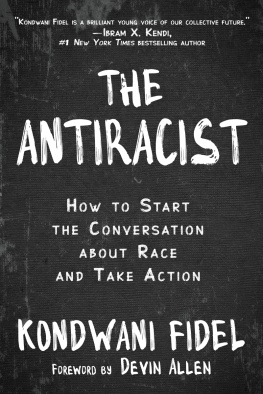Jennie Stephens - Diversifying power : why we need antiracist, feminist leadership onclimate and energy
Here you can read online Jennie Stephens - Diversifying power : why we need antiracist, feminist leadership onclimate and energy full text of the book (entire story) in english for free. Download pdf and epub, get meaning, cover and reviews about this ebook. year: 2020, genre: Politics. Description of the work, (preface) as well as reviews are available. Best literature library LitArk.com created for fans of good reading and offers a wide selection of genres:
Romance novel
Science fiction
Adventure
Detective
Science
History
Home and family
Prose
Art
Politics
Computer
Non-fiction
Religion
Business
Children
Humor
Choose a favorite category and find really read worthwhile books. Enjoy immersion in the world of imagination, feel the emotions of the characters or learn something new for yourself, make an fascinating discovery.
- Book:Diversifying power : why we need antiracist, feminist leadership onclimate and energy
- Author:
- Genre:
- Year:2020
- Rating:5 / 5
- Favourites:Add to favourites
- Your mark:
- 100
- 1
- 2
- 3
- 4
- 5
Diversifying power : why we need antiracist, feminist leadership onclimate and energy: summary, description and annotation
We offer to read an annotation, description, summary or preface (depends on what the author of the book "Diversifying power : why we need antiracist, feminist leadership onclimate and energy" wrote himself). If you haven't found the necessary information about the book — write in the comments, we will try to find it.
Jennie Stephens: author's other books
Who wrote Diversifying power : why we need antiracist, feminist leadership onclimate and energy? Find out the surname, the name of the author of the book and a list of all author's works by series.
Diversifying power : why we need antiracist, feminist leadership onclimate and energy — read online for free the complete book (whole text) full work
Below is the text of the book, divided by pages. System saving the place of the last page read, allows you to conveniently read the book "Diversifying power : why we need antiracist, feminist leadership onclimate and energy" online for free, without having to search again every time where you left off. Put a bookmark, and you can go to the page where you finished reading at any time.
Font size:
Interval:
Bookmark:
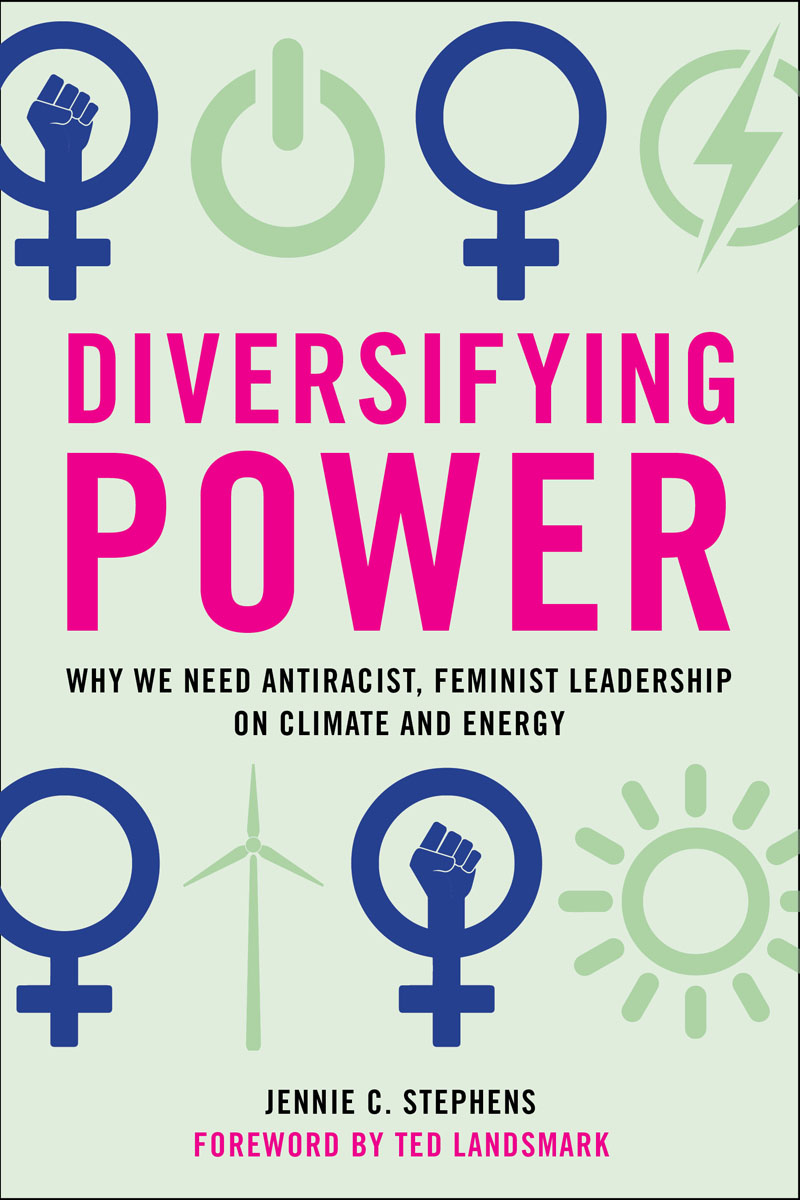
About Island Press
Since 1984, the nonprofit organization Island Press has been stimulating, shaping, and communicating ideas that are essential for solving environmental problems worldwide. With more than 1,000 titles in print and some 30 new releases each year, we are the nations leading publisher on environmental issues. We identify innovative thinkers and emerging trends in the environmental field. We work with world-renowned experts and authors to develop cross-disciplinary solutions to environmental challenges.
Island Press designs and executes educational campaigns, in conjunction with our authors, to communicate their critical messages in print, in person, and online using the latest technologies, innovative programs, and the media. Our goal is to reach targeted audiencesscientists, policy makers, environmental advocates, urban planners, the media, and concerned citizenswith information that can be used to create the framework for long-term ecological health and human well-being.
Island Press gratefully acknowledges major support from The Bobolink Foundation, Caldera Foundation, The Curtis and Edith Munson Foundation, The Forrest C. and Frances H. Lattner Foundation, The JPB Foundation, The Kresge Foundation, The Summit Charitable Foundation, Inc., and many other generous organizations and individuals.
The opinions expressed in this book are those of the author(s) and do not necessarily reflect the views of our supporters.

Island Presss mission is to provide the best ideas and information to those seeking to understand and protect the environment and create solutions to its complex problems. Click here to get our newsletter for the latest news on authors, events, and free book giveaways.

Copyright 2020 Jennie C. Stephens
All rights reserved under International and Pan-American Copyright Conventions. No part of this book may be reproduced in any form or by any means without permission in writing from the publisher: Island Press, Suite 650, 2000 M Street, NW, Washington, DC 20036
Library of Congress Control Number: 2020939046
All Island Press books are printed on environmentally responsible materials.
Manufactured in the United States of America
10 9 8 7 6 5 4 3 2 1
Cover images courtesy of Shutterstock.com: wind power by AF studio; lightning by SmartMark; fist by Yevhen Chernukha; switch by GoperVector
Sun image by Ahkm, courtesy of freeiconspng.com
Keywords: antiracist, climate change, climate denial, climate isolationism, diversity, energy democracy, environmental justice, feminism, green jobs, Green New Deal, housing, leadership, polluter elite, precarity, prosperity, public health, reclaim, renewable energy, resist, restructure, transportation
For my grandmothers
SARAH COAN ACHESON
19202010
ITA JOYCE STEPHENS
19252011
All author proceeds from sales of this book will be donated to the NAACPs Environmental and Climate Justice Program.
We must reject not only the stereotypes that others have of us
but also those that we have of ourselves.
Shirley Chisholm
Dr. Ted Landsmark
I grew up in the 1950s as a postpolio black son of a single parent in East Harlems projects. My strong mother, a public health nurse, inspired me to have the vision, imagination, and resilience to survive the vicissitudes of growing up black in America and to build my life around my strengths, rather than on my needs.
Dr. Jonas Salks polio vaccine had been developed too late for me to have avoided the viral pandemic that crippled millions of people around the world, including President Franklin Roosevelt. By the early 1960s, the March of Dimes mobilization of community support for a shared approach to solving the polio public health crisis had begun to fade from memory. Urban life in New Yorks public housing for the poor also shielded me from the environmental concerns being expressed primarily by suburban and rural activists. As working-class urban baby boomers, we were largely oblivious to the policy links between public health, environmental resilience, institutional racism, and social justice. We were more concerned with building movements to address nuclear proliferation and civil rights.
When I encountered environmentalism as a college student, I pondered how the ecological ideas of landscape designer Ian McHargs Design with Nature (1969) or the environmental degradation admonitions of Rachel Carsons Silent Spring (1962) might resonate among the people Id grown up with. McHarg traced how parts of the New Jersey coast might disappear if struck by a devastating storm, while Carson revealed the negative health effects of chemical pesticides used in agriculture. The environmentalists concerns had made almost no impression on my Harlem community. Few of the young African Americans Id grown up with saw beyond their immediate needs for getting an education, finding a good job, and avoiding the bad effects of street life. Environmental concerns or global pandemic responses were less important as social justice issues than avoiding the impacts of urban poverty.
Community-based perceptions of what constitutes social justice have expanded since then. Hurricane Katrina (2005), Superstorm Sandy (2012), California wildfires (2017, 2018), and Puerto Rican Hurricanes Maria (2017) and Dorian (2019) have all had devastating effects on poor communities of color. The failure of largely white policy makers to prepare forand respond adequately toglobal public health and environmental threats has worsened racial disparities and social injustices. This failure has reinforced the sense that The Man doesnt care about supporting impoverished communities of color, even as those communities have provided the cheap labor and exploitable resources that have supported American capitalism. Residents of the predominantly black Ninth Ward in New Orleans asked, Why did white folks in the Historic French Quarter get recovery aid before we did, and why did this disaster hit us harder in the first place? Communities across the United States asked why governmental responses to the COVID-19 pandemic failed to address the disparate impacts of that global disaster on poor, largely urban, and aging people of color.
As this urgent book makes clear, a new era of diverse leadership is rising up to resist climate injustices. Young activists and progressive politicians are now connecting the climate crisis with public health and social justice. They are resisting how fossil fuel energy companies have paid lobbyists and propogandists to spread falsehoods that oil and gas investments do not damage environments or add to pollution through offshore drilling and onshore fracking. They are resisting how the lure of job creation and corporate profits have been prioritized over public health and environmental quality. They are resisting how public officials have brazenly stripped terms like climate change from official government documents and dismissed concerns about growing economic inequities.
As communities most at risk and those with the fewest resources have begun to protest the effects of these environmental disruptions, diverse leadership is now calling for more transformative change. Women are increasingly assuming leadership roles in social justice movements, from environmentalism to #MeToo to Black Lives Matter. Among youths of color, the climate crisis is now viewed as an existential threat that is directly linked to economic and racial justice.
Next pageFont size:
Interval:
Bookmark:
Similar books «Diversifying power : why we need antiracist, feminist leadership onclimate and energy»
Look at similar books to Diversifying power : why we need antiracist, feminist leadership onclimate and energy. We have selected literature similar in name and meaning in the hope of providing readers with more options to find new, interesting, not yet read works.
Discussion, reviews of the book Diversifying power : why we need antiracist, feminist leadership onclimate and energy and just readers' own opinions. Leave your comments, write what you think about the work, its meaning or the main characters. Specify what exactly you liked and what you didn't like, and why you think so.

